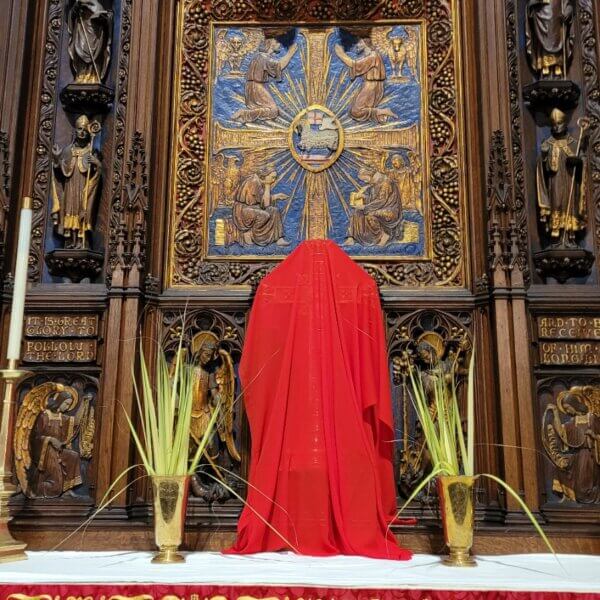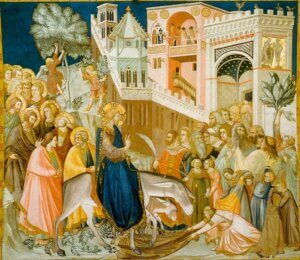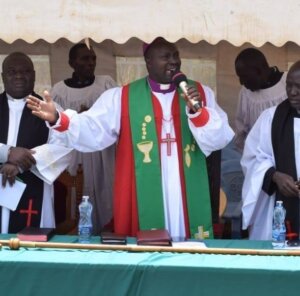
Parade Planning
 Today is a day of contrast in the church — peaks and valleys of joy and horror, celebration and grief, activity and paralysis, and community and isolation. We begin with the Liturgy of the Palms, from the high point on the Mount of Olives in Bethphage, where Jesus directs his disciples to organize a ragtag — but very enthusiastic — parade. They shout hosannahs and wave leafy branches all the way down to the Garden of Gethsemane, through the Kidron Valley and back up Mount Moriah to the walled city of Jerusalem. We use palms here at Emmanuel, but the point is to find whatever it is that says “party” to you, and gather it up and wave it around as you join in the parade.
Today is a day of contrast in the church — peaks and valleys of joy and horror, celebration and grief, activity and paralysis, and community and isolation. We begin with the Liturgy of the Palms, from the high point on the Mount of Olives in Bethphage, where Jesus directs his disciples to organize a ragtag — but very enthusiastic — parade. They shout hosannahs and wave leafy branches all the way down to the Garden of Gethsemane, through the Kidron Valley and back up Mount Moriah to the walled city of Jerusalem. We use palms here at Emmanuel, but the point is to find whatever it is that says “party” to you, and gather it up and wave it around as you join in the parade.
After the parade, we move to the Passion Narrative we just read. The Book of Common Prayer calls this day The Sunday of the Passion: Palm Sunday — holding the celebratory enthusiasm of the Liturgy of the Palms in tension with the deep horror of the passion narrative. While we’re still reeling from grief and horror as the religious authorities, accompanied by Pilate’s guard of soldiers, seal Jesus’ tomb at the end of Matthew’s passion narrative, we really need to return to the beginning of the parade route to help us understand our role in what comes next, when things get real — fast.
Go into the village ahead of you, Jesus says in Matthew’s gospel, and you will find a donkey tied, and a colt with her; untie them and bring them to me.
They cut leafy branches, spread their cloaks over the donkey and her colt for Jesus to sit on, and laid their cloaks and branches cut from the trees on the path. Over half of the Liturgy of the Palms reading is about the little details of putting this parade together. Did the disciples have any experience at all in parade organization, donkey training, or the unprecedented conflict of believing and belonging to Jesus that was unfolding as they walked that path for the first time? Clearly no, and yet they did it all.
It’s just like the work we’ve been doing over these last weeks in planning our Palm Sunday service today, and Holy Week and Easter services next week. Should we process with the palms all the way around the block? How do we include those waiting behind in the church? Can we throw coats down in the path, or will people trip over them? Where do we stand for the passion reading so our new sound system can pick up the sound? Are we crazy to try all of this on the first day we use our new streaming cameras? Will Randy actually levitate if this all works?
Communities
 Our very lives are formed with these interwoven, essential details — real in-the-moment, on-the-ground choices of how to live, work, and care for our families and our communities. I want to tell you about a family I’ve gotten to know over these past months. Mom and Dad have five kids, from 20 down to 10, with an extra “adopted” daughter who’s 25, so six kids in all. They’re a religious family — in fact, Dad’s a clergyman — and they’re deeply involved in their community. The oldest three are girls, and they’re serious about their school work, devoting hours a day to homework to keep up. There are two boys in the middle, ages 12 and 14, and they’re athletic and strong — and a little less focused on their school work than the older girls. The youngest, a girl, is serious and kind, with a really winsome smile that moves all the way up her face into her eyes, lighting her up from inside. I know these things because this family stays in touch with me, letting me know how they’re doing, and how happy they are to hear our news from Emmanuel. We are in their prayers at their church. We are companions in faith and community.
Our very lives are formed with these interwoven, essential details — real in-the-moment, on-the-ground choices of how to live, work, and care for our families and our communities. I want to tell you about a family I’ve gotten to know over these past months. Mom and Dad have five kids, from 20 down to 10, with an extra “adopted” daughter who’s 25, so six kids in all. They’re a religious family — in fact, Dad’s a clergyman — and they’re deeply involved in their community. The oldest three are girls, and they’re serious about their school work, devoting hours a day to homework to keep up. There are two boys in the middle, ages 12 and 14, and they’re athletic and strong — and a little less focused on their school work than the older girls. The youngest, a girl, is serious and kind, with a really winsome smile that moves all the way up her face into her eyes, lighting her up from inside. I know these things because this family stays in touch with me, letting me know how they’re doing, and how happy they are to hear our news from Emmanuel. We are in their prayers at their church. We are companions in faith and community.
Like many of our neighbors we help with the Rector’s Discretionary Fund, this family is having a tough time. You know the reasons — it costs more and more to buy less and less, and raising a family is hard. We know this in the case of our own children, or our friends’, coworkers’, or siblings’ children. Only in the case of the Tuliapus family in Kapenguria Diocese in Kenya, people are dying of hunger every day. In much of East Africa, everyday people like us survive on a staple meal of ugali, a pasty pudding made of corn. I learned how to make ugali the summer I lived in Tanzania, but I never developed a taste for it. That was ok because I had other choices — beans, lentils, bananas, and fresh vegetables from the garden on the bishop’s compound. But in Kenya, the maize and millet crops have failed for the second year, and local supplies are scarce and too expensive for everyday people to afford.
 Bishop Samson has asked if we could help with some money just to buy food to feed the people who come to his door hungry, because they have nothing to eat. But why would we help this family — and their community — seven time zones, an ocean, and the better part of an enormous continent away from us? First, we do help those near us, every day, all the time. Second, living together in community, helping and healing, and being helped and healed by others, is what that whole crazy parade was about this morning. It’s to get us ready to work together on small essential details, to train us up to feel and to act on our deep human connection — no matter how different we are — so that we’re ready when things get real fast, just like they did after the parade down the Mount of Olives that ended with the crucifixion.
Bishop Samson has asked if we could help with some money just to buy food to feed the people who come to his door hungry, because they have nothing to eat. But why would we help this family — and their community — seven time zones, an ocean, and the better part of an enormous continent away from us? First, we do help those near us, every day, all the time. Second, living together in community, helping and healing, and being helped and healed by others, is what that whole crazy parade was about this morning. It’s to get us ready to work together on small essential details, to train us up to feel and to act on our deep human connection — no matter how different we are — so that we’re ready when things get real fast, just like they did after the parade down the Mount of Olives that ended with the crucifixion.
Bishop Samson and Mama Bishop Diana — and their children Rehema, Rachel, Timothy, Titus, and Sheila — are as bound up in who we are as human beings as anyone sitting beside you in the pew today or passing you in the street. In fact their very physical and cultural distance from us may help us notice the ways that this lovely family is more like us than different from us. When we’re in groups here at home, we can get distracted by the tiny differences like which of the 13 or so Rhode Island accents people have, whether they live in Newport, Middletown, Portsmouth or off-island, or whether they’re transplanted Northern New Yorkers by way of Atlanta like your rector.
This is what Jesus was getting us ready for with all the detailed instructions on donkey wrangling, and what the coats and leafy branches were for. This was to help us see our best selves, and give us all a part to play — a way to connect and help — so we’re ready when things get real. Amen
